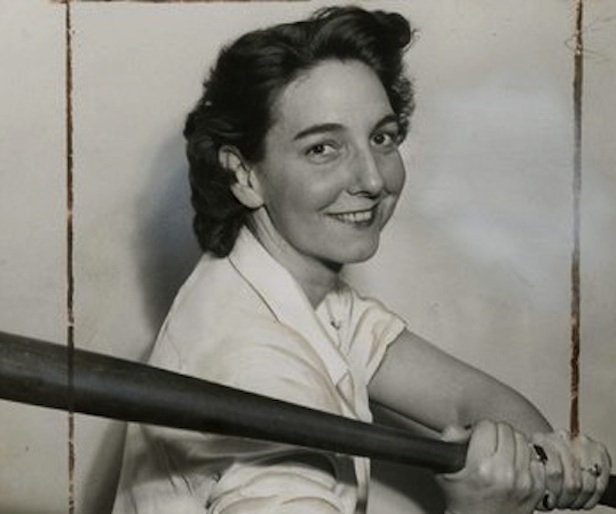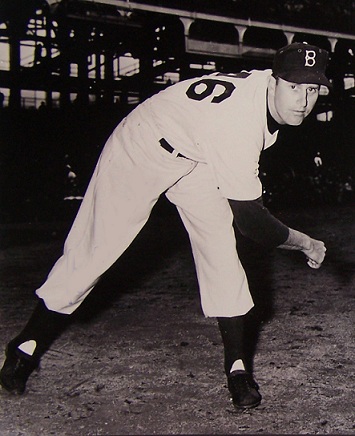While watching the sporting news a couple of weeks ago something on the ticker caught my attention. I just can’t help reading ticker information. The brief clip read: “First female baseball scout dies”. Not giving it much thought when I first saw it, I became more interested when the clip rolled around again. I naturally thought that a female in major league baseball as a scout must have occurred within the last thirty or so years. I decided to Google it and learned that the first female scout in major league baseball was Edith Houghton, who had died a few days before turning 101. I learned she was a scout for the Phillies, beginning 65 years ago, from 1946-1952. She signed fifteen players while scouting for the Phillies, although none of them became well known names.

Edith Houghton was the first female scout in professional baseball. Edith died last week. She was 100 years old. (Photo courtesy of Philly.com)
I was satisfied with that information although I also learned about her playing career in women’s baseball, in which she excelled, and that she was a decorated member of the military in the Unites States. I have always been interested in baseball scouting and my interest peaked again with Gus Lobel (Clint Eastwood) in Trouble With the Curve and Edith Houghton’s death announcement.
I have read that scouting it is not an exact science. There never was any doubt in my mind about that. I also had read that maybe it is more of an art. Art or science it is one of the most difficult and important roles with any major league baseball team. Former MLB scouting bureau director Don Pries goes one step further. He claims scouting is in fact the most important part of the game. His reason for making the claim: “ We go out and decide who can play and who can’t.” There is definitely power in that position. I tend to think that scouting is more of an art although I recognize there are a wide variety of tools that the scouting system uses to determine which players to draft. However, there is no formula or crystal ball that guarantees any given degree of success. There is no way to control the variables that make or break the careers of young players. Former Los Angeles Dodgers’ scouting director, Ben Wade, put it simply: “The scouts can’t see everybody, and even if they do, they may see them on a bad day.”
I scouted (pun intended) around a bit and decided to check on Dodger scouts who have had notable success, through whatever method they use to evaluate players. I can remember Fresco Thompson who was the Dodgers’ farm director from 1949 to 1968. All Dodger fans recognize Mike Brito and his Panama hat, the scout who brought Fernando Valenzuela and Fernandomania to the Dodgers. Logan White is a household Dodger name, formerly assistant general manager for amateur and international scouting, and now vice president of scouting. Most recently the Dodgers have signed Bob Engle and his team of former Seattle Mariner scouts to beef up the Dodger scouting presence in Latin America because of their success in that area.
In my search I came across a name I recognized as a pitcher with the Dodgers in the fifties. It was the aforementioned Ben Wade. For some unknown reason, I either didn’t know or have forgotten that he had a very successful career scouting with the Dodgers.
Wade pitched for the Dodgers for only two seasons and part of a third one. His first year as a Dodger, 1952, was his best year as a major league baseball player. He won eleven games, pitched 180 innings and had an ERA of 3.60. That was his first and last year as a MLB starter. In 1953 there was no room on the starting staff with Carl Erskine, Billy Loes, Russ Meyer, Preacher Roe and Johnny Podres penciled into the rotation. Wade pitched mostly middle relief that year and in 1954 was traded to the Cardinals in mid season.
During his brief time with the Dodgers Ben Wade had two trivia moments. On July 6, 1952 he homered twice off the same pitcher in an 8-2 Dodger victory, completing the Dodgers thirteenth win in a row against the Braves. The Braves pitcher that day was none other than Warren Spahn. On May 28, 1954 Wade was on the other end of a home run barrage. In the eighth inning of a Dodger shellacking by the Giants he served up four home runs, hit by Davey Williams‚ Alvin Dark‚ Monte Irvin‚ and Billy Gardner.
Wade returned to the Dodgers as a scout in 1962. The Dodgers must have seen some scouting genius in him as he became the Director of Scouting in 1973. During his tenure as scout and Director of Scouting the team was supplied with players that would lead it to eight National League championships and four World Series titles during the 1960s, 1970s and 1980s. Among the players drafted during Wade’s tenure as scouting director were Mike Piazza, Rick Sutcliffe, Dave Stewart, Mike Scioscia, Bob Welch, Mickey Hatcher, Steve Sax, Mike Marshall, Steve Howe, Orel Hershiser, John Franco, John Wetteland, Eric Karros and Eric Young.
Ben Wade may well have earned the title of Rookie Of The Year Scouting Director. Under his watch the Dodgers earned seven Rookie Of The Year awards in a period of sixteen years starting with Rick Sutcliffe in 1979, followed by Steve Howe, Fernando Valenzuela and Steve Sax in the next three years. Mike Piazza and Eric Karros were both drafted in 1988 and Raul Mondesi was signed as an amateur free agent in the same year; all three went on to earn Rookie Of The Year awards.
Although Mike Piazza has fallen someone out of favor with the Dodger faithful, Ben Wade was instrumental in signing him. With Wade watching Piazza was more than impressive with a display of power. Wade was quickly convinced to find a spot for Piazza, who was drafted in the 62nd round. Along with Tommy Lasorda they agreed to convert Piazza from first base to catching. Wade signed him with a $15,000 bonus.
At times we may not understand that unforeseen circumstances affect a first round draft selection. Can you imagine the excitement in the Red Sox camp when the Dodgers selected Erik Sonberg with the eighteenth pick in 1983. Roger Clemens was then snatched up the Red Sox with their nineteenth first round selection. Ben Wade explained that he would have taken Clemens but there was another unfortunate issue with the Dodgers. That issue was Steve Howe and his problem with cocaine addiction. The Dodgers felt they needed a left-hander because of the uncertainty with Howe. Sonberg never made it to the majors. Without the tragic situation with Steve Howe, Mike Piazza and Roger Clemens may well have been Dodger team mates.
Despite the hit and miss nature of drafting players, Ben Wade did have a successful career as a Dodger scout and Director of Scouting. In his last few years as Director of Scouting he began to have more misses. His lack of success with first round selections, mostly pitchers in the late eighties, became frustrating. The frustration mounted because of a series of career ending arm injuries to young pitchers who held so much promise on draft day. He retired after the 1990 season. In all he had served thirty-two years as a player, scout and Director of Scouting with the Dodgers. For twenty-nine of those years he had the most important job in baseball, deciding who could play the game and who could not.
Benjamin Styron Wade died on December 2, 2002 in Los Angeles. He was 80 years old.




 February 26th, 2013 at 5:56 am
February 26th, 2013 at 5:56 am  by Harold Uhlman
by Harold Uhlman 
 Posted in
Posted in 

As usual, Harold, you nailed it! Another great story. I’m certain the baseball scout who relies on a player’s natural instincts and abilities, vs. those who are more statistically driven, is a dying breed these days. Thanks for reminding us who’s been putting the players there.
Great story Harold. I don’t know how I never caught on to the fact that Howe’s drug addiction caused the Dodgers to miss out on Roger Clemens. Another Hall of Fame caliber player lost due to unforeseen circumstances. Roberto Clemente, Pedro Martinez, now Clemens. What could have been?
Yep – another good eduction for us Dodger faithfuls. Are there any female scouts now?